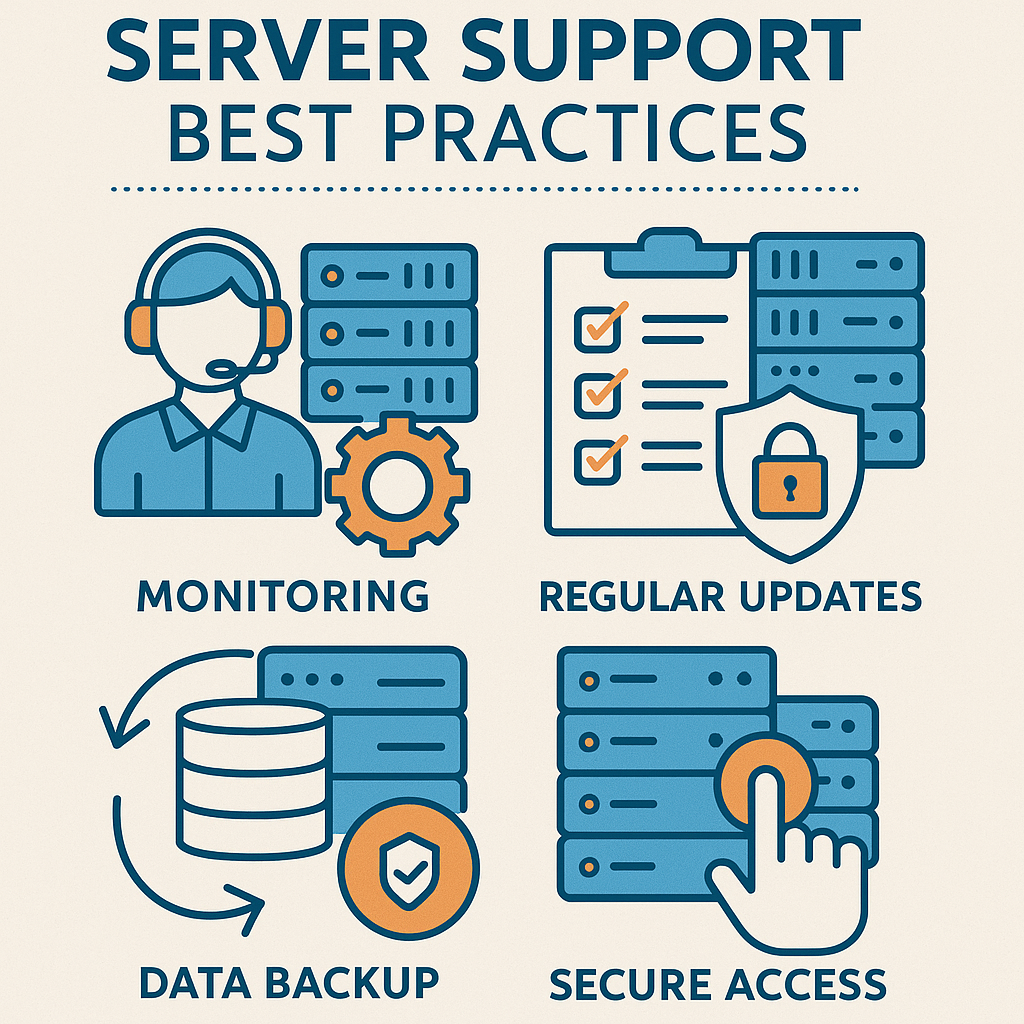Server Support Demystified: The Hidden Hero of Business IT

In the bustling world of modern business, where digital transactions happen in milliseconds and customer expectations soar higher each day, there’s an unsung champion working tirelessly behind the scenes. Server support professionals are the guardians of your digital infrastructure, ensuring that everything from your email system to your e-commerce platform runs smoothly. Yet despite their critical role, server support remains one of the most misunderstood aspects of business IT.
What Exactly Is Server Support?
Think of server support as the emergency room and preventive care clinic for your business’s digital backbone. These specialists monitor, maintain, troubleshoot, and optimize the physical and virtual servers that power your organization’s daily operations. They’re the first responders when systems crash at 3 AM, the strategists planning capacity upgrades, and the security sentries protecting your data from cyber threats.
Server support encompasses everything from hardware maintenance and software updates to performance optimization and disaster recovery planning. It’s a multifaceted discipline that requires technical expertise, problem-solving skills, and the ability to work under pressure when business-critical systems are at stake.
The True Business Impact of Quality Server Support
When server support works well, it’s invisible to most employees and customers. Applications load quickly, emails flow seamlessly, and online transactions process without a hitch. But when it fails, the consequences ripple throughout the entire organization.
Consider the financial implications of server downtime. Studies show that the average cost of IT downtime ranges from $5,600 per minute for small companies to over $9,000 per minute for large enterprises. Beyond the immediate revenue loss, there’s the hidden cost of employee productivity grinding to a halt, customer frustration leading to churn, and potential damage to your brand reputation.
Quality server support acts as your insurance policy against these scenarios. Proactive monitoring can identify potential issues before they escalate into full-blown outages. Regular maintenance prevents small problems from becoming major headaches. And when problems do occur, skilled support teams can diagnose and resolve them quickly, minimizing business disruption.
Common Server Support Challenges in Today’s Business Environment
Modern businesses face an increasingly complex server landscape. The shift toward hybrid cloud environments means managing both on-premises hardware and cloud-based infrastructure. Legacy systems must coexist with cutting-edge applications. Security threats evolve constantly, requiring vigilant monitoring and rapid response capabilities.
One of the biggest challenges is the skills gap in the IT industry. Finding qualified server support professionals who understand both traditional infrastructure and modern cloud technologies can be difficult and expensive. Many businesses struggle to maintain adequate 24/7 coverage, especially smaller organizations that can’t justify a full in-house team.
Resource allocation presents another challenge. Server hardware and software require significant upfront investments, ongoing licensing fees, and regular upgrades. Balancing performance needs with budget constraints requires careful planning and expertise that many businesses lack internally.
Internal vs. Outsourced Server Support: Making the Right Choice
The decision between building an internal server support team and outsourcing to specialists depends on several factors unique to each organization. Internal teams offer deep knowledge of your specific systems and business processes. They’re immediately available during business hours and can be integrated into broader IT strategy discussions.
However, internal teams come with significant overhead costs including salaries, benefits, training, and the need to maintain expertise across multiple technologies. They may also lack the specialized knowledge needed for complex problems or emerging technologies.
Outsourced server support provides access to specialized expertise without the overhead of full-time employees. Managed service providers typically offer 24/7 monitoring and support, which would be prohibitively expensive for most businesses to maintain internally. They also bring experience from working with multiple clients and technologies, often leading to faster problem resolution.
The hybrid approach is gaining popularity, where businesses maintain basic internal IT capabilities while outsourcing specialized server support functions. This model provides the best of both worlds: internal staff who understand the business combined with external expertise for complex technical challenges.
Key Technologies Shaping Modern Server Support
Artificial intelligence and machine learning are revolutionizing server support by enabling predictive maintenance and automated problem resolution. These technologies can analyze vast amounts of performance data to identify patterns that indicate potential failures before they occur.
Containerization and microservices architectures are changing how applications are deployed and managed, requiring new skills and tools for effective server support. Infrastructure as code enables more consistent and reliable server deployments while reducing manual configuration errors.
Cloud-native monitoring tools provide unprecedented visibility into system performance and user experience. These platforms can correlate data across multiple systems to provide holistic insights into application health and performance.
Building a Proactive Server Support Strategy
Effective server support goes beyond reactive troubleshooting. It requires a comprehensive strategy that includes regular health assessments, capacity planning, security monitoring, and disaster recovery preparation. Establishing clear service level agreements helps set expectations and provides measurable goals for support teams.
Documentation plays a crucial role in effective server support. Maintaining detailed records of system configurations, known issues, and resolution procedures enables faster problem solving and knowledge transfer. Regular testing of backup and recovery procedures ensures that business continuity plans will work when needed.
Performance baseline establishment allows support teams to quickly identify when systems are operating outside normal parameters. Regular capacity reviews help prevent performance degradation as business needs grow and change.
The Future of Server Support
As businesses continue their digital transformation journeys, server support will become even more critical to organizational success. The increasing adoption of edge computing, Internet of Things devices, and artificial intelligence applications will create new challenges and opportunities for server support professionals.
Automation will handle more routine maintenance tasks, allowing human experts to focus on strategic planning and complex problem solving. However, the human element will remain essential for understanding business context, making critical decisions during outages, and adapting to unexpected scenarios.
The most successful organizations will be those that recognize server support as a strategic business function rather than just a technical necessity. They’ll invest in the right combination of people, processes, and technology to ensure their digital infrastructure can support current operations while scaling to meet future demands.
Server support may operate in the shadows, but its impact on business success is undeniable. By understanding its importance and investing appropriately, organizations can transform their IT infrastructure from a source of anxiety into a competitive advantage that drives growth and innovation.






